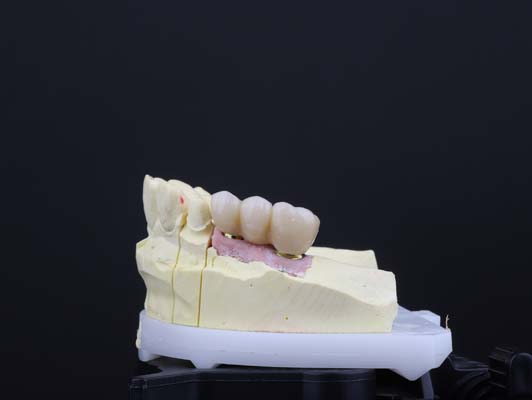How a Dental Bridge Is Held in Place

A dental bridge is an oral prosthetic that closes the space left by multiple missing teeth. It has two main components: artificial teeth called pontics and crowns (abutments) placed on the two teeth closest to the space on both sides. The artificial teeth can be made from various materials like gold, silver, and other metals, but porcelain pontics are the most popular since they look just like natural teeth.
Anchoring down a dental bridge
The type of dental bridge being installed in the patient’s mouth often dictates how the dentist goes about anchoring it down. Let us take a look at the four main types of dental bridges used in dentistry:
1. Conventional dental bridge
Traditional dental bridges are anchored down on the two teeth closest to the gap left by missing teeth. Crowns are usually placed on these teeth to strengthen them so they can provide more stability for the bridge. Preparing the abutments from crowns requires taking off enamel from their sides. That permanently leaves them altered, so they will always need a restoration to serve as their artificial enamel.
2. Cantilever dental bridge
Cantilever bridges are similar to traditional bridges, but there is one significant difference; the pontics are anchored down to only one abutment. These types of bridges are typically recommended when there is only one tooth next to the space left by lost teeth.
3. Maryland dental bridge
These also use two abutments like traditional bridges, but it does not require placing crowns on the teeth closest to the gap. Maryland bridges use a porcelain or metal framework bonded to the backside of the two teeth closest to the gap.
4. Implant-supported dental bridge
Implant-supported bridges might be recommended for patients who want a complete missing teeth solution. Implants are metal rods that serve as artificial teeth roots, and they help prevent the bone tissue loss that takes place when a tooth is lost.
Implants also happen to be one of the pricier ways to replace missing teeth, so dentists often recommend combining them with other restorations to reduce costs. That way, the patient still gets the bone preserving properties of implants while saving a considerable about of money. To keep things in perspective, the price of a single implant is typically more than the cost of a full set of dentures.
Implant-supported bridges involve inserting implants at the two ends of the space left by missing teeth and placing crowns on them. These crowns then serve as abutments that hold pontics that replace the rest of their missing teeth in place.
Benefits
Some of the benefits of replacing missing teeth with dental bridges include:
- Improves the patient’s smile
- Restores speech
- Improves chewing ability
- Helps to preserve the shape of the patient’s teeth
- Prevents the patient’s remaining teeth from moving out of their proper alignment
Replace your missing teeth
A dental bridge is one of the options you should consider if you have missing teeth. Give us a call or visit our Escondido clinic to set up an appointment with our dentist.
Request an appointment here: https://www.escofamimplants.com or call Escondido Family Dental & Implants at (760) 740-0409 for an appointment in our Escondido office.
Check out what others are saying about our dental services on Yelp: Dental Bridges in Escondido, CA.
Recent Posts
Dental bridges are an excellent way to replace missing teeth and maintain your smile. When you have a dental bridge, you must know the different types of bridges available to make the best decision for your personal needs. This article will cover four types of dental bridges: fixed bridgework, traditional removable dentures, implant-supported dentures, and…
When a patient has dental implants, follow-up visits are important. Many patients need to have replacement teeth for a variety of reasons. You may have gotten them because you lost several teeth due to a traumatic accident, or you may have been on medication that caused your teeth to deteriorate. Regardless of how you lost your…
There are many factors to consider in your search for a family dentist. You want a professional who can help you achieve and maintain a brilliant smile, but there is much more involved in taking care of your teeth. To ensure optimal oral health for yourself and your children, regular dental visits are critical. You…
After each routine visit to your general dentist, you may receive a few tips or recommendations from your dentist to continue to maintain or boost your oral health. Although these tips vary from patient to patient, there are a few tips that dentists share across the board.Dentists recommend that you brush your teeth at least…


